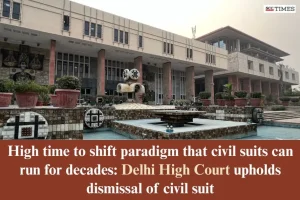Delhi High Court: In a petition filed by the petitioner to recall respondent for cross-examination by challenging the order passed by the Trial Court, whereby his application under Order 13 Rule 17 of the Civil Procedure Code, 1908 (‘CPC’) in the suit for recovery of loan amount, was dismissed, a Single Judge Bench of Girish Kathpalia, J., held that it was high time that paradigm be changed by Courts and an impression across the society be dispelled that civil suits can be allowed to run for decades. Accordingly, the Court upheld the impugned order and dismissed the petitioner’s application.
Background
In the present case, the petitioner’s counsel had repeatedly sought adjournment on various grounds. In November 2024, he sought so that he had met with an accident which was allowed by the Trial court. Further, in February 2025, he again quested for the same citing that the lawyers were on strike, so he did not appear, and the matter thus got adjourned. On the next date in June 2025, he requested a proxy counsel to seek pass over. However, the Trial Court closed the cross-examination of the respondent and posted the matter on a further date. He again did not appear on the date concerned, so the right to lead his evidence was closed.
The petitioner’s counsel contended that in June 2025, a proxy counsel appeared on his behalf to seek pass-over which was denied and requested that he had a good case on merits, so another opportunity should be granted to him. Per contra, the respondent strongly objected to it and argued that eleven adjournments were taken with the sole aim of delaying the suit proceedings.
Analysis and Decision
The Court stated that it was repeatedly held by the Supreme Court as well as all High Courts across the country that strike by lawyers was not a justified ground for defaults as the Courts were never on strike. Further, the Court emphasized that the judicial record is sacrosanct, and it clearly stated that nobody appeared as proxy of petitioner’s counsel in June 2025.
The Court specified that if proceedings were not correctly recorded in the order sheet, the party concerned should immediately move the same Court for rectification, failing which the party concerned could not be allowed later to challenge correctness of its contents. The Court, thus, stated that the petitioner never approached the Trial court, seeking rectification of order passed in June 2025 to the effect that a proxy counsel on behalf of petitioner had appeared and had requested for passover, which was declined. Further, upon pursuing the said records, the Court noted that in June 2025, the default was not just for appearance on behalf of the petitioner but also with regards to the failure to pay cost for which there was no explanation given. The Court further highlighted that in September 2025, the petitioner’s counsel sought adjournment on the ground of illness. Thus, the matter was listed for final hearing in October 2025.
The Court held that the above showed blatant and deliberate design on the part of petitioner to continue to protract the Trial Court proceedings, which was with the obvious aim to frustrate the respondent into giving up the litigation. Further, the Court opined that where a party not just defaults in appearing but also contumaciously defies clearing the cost, consequences stipulated under Section 35-B of the CPC, the defaulting party must be stopped from participating further in the proceedings, as settled by the Supreme Court.
The Court opined that it was time that paradigms be changed by Courts, and an impression across the society be dispelled that civil suits can be allowed to run for decades. Therefore, the Court dismissed the application by upholding the impugned order.
[Sohn Singh v. Dildar Singh, CM(M) No. 1998 of 2025, decided on 15-10-2025]
Advocates who appeared in this case :
For the Petitioner: Amrik Singh, Advocate
For the Respondent: Deepak Mittal, Advocate

